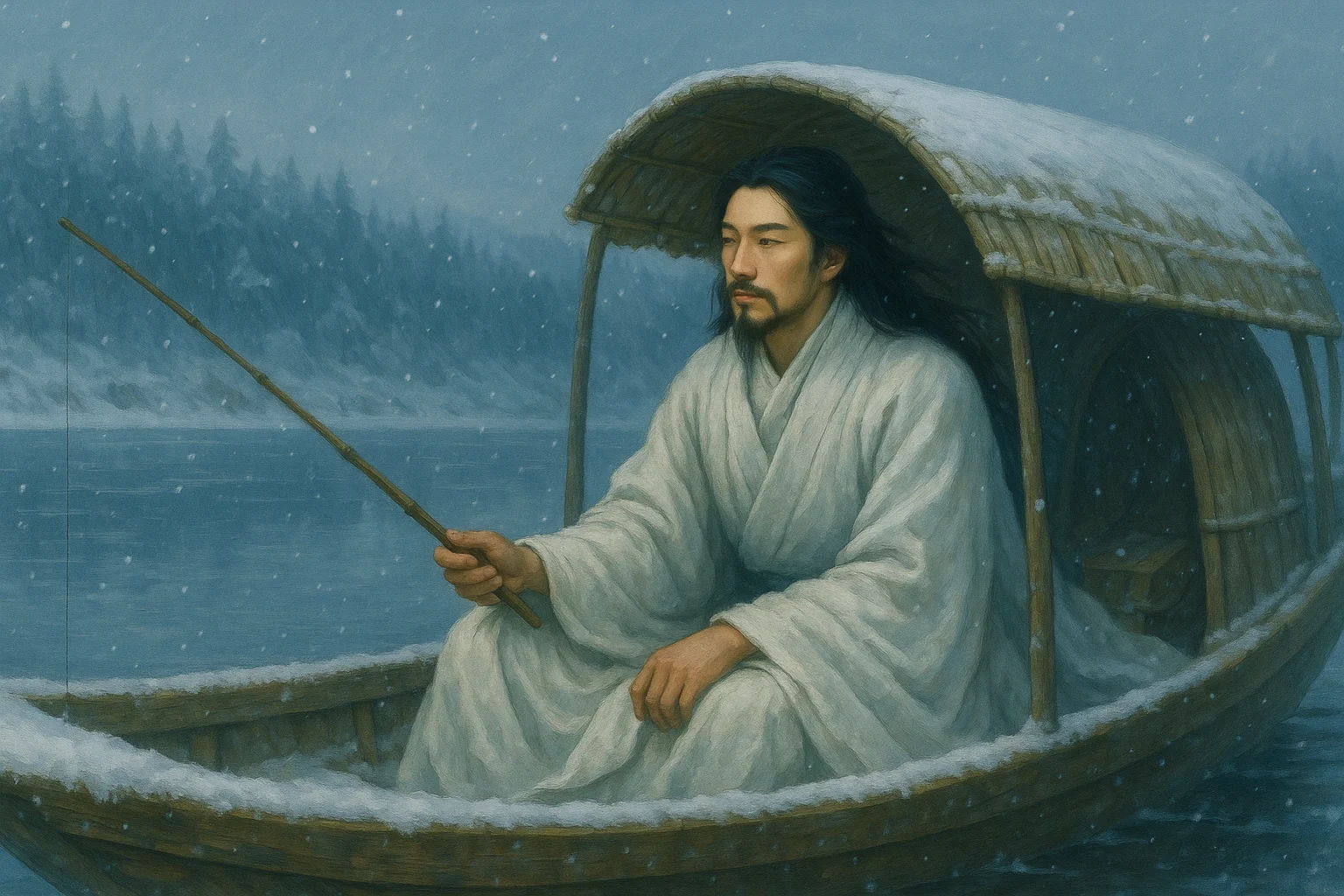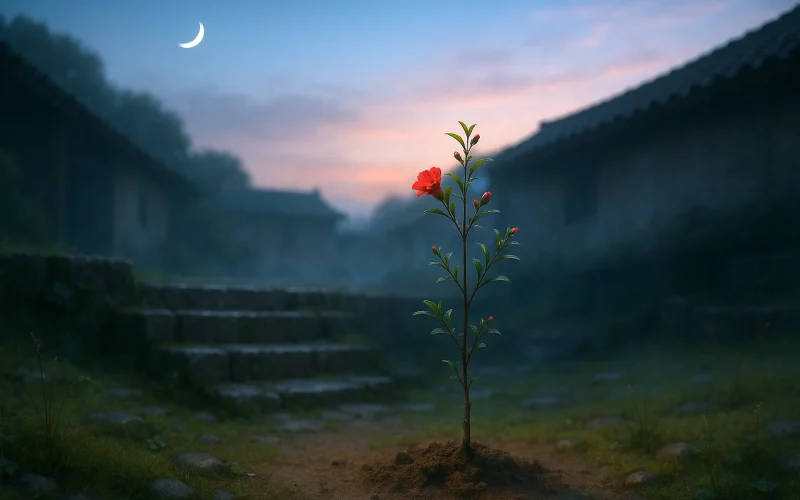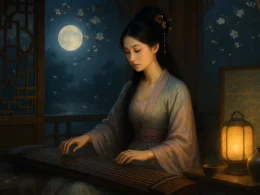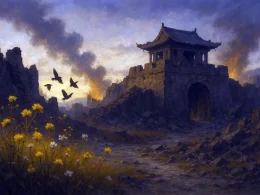The River Xiang flows as of yore;
I’m on it now, as once before.
When shall I come again? Who knows?
Another stretch of time must close.
Original Poem
「再上湘江」
柳宗元
好在湘江水,今朝又上来。
不知从此去,更遣几年回。
Interpretation
This poem was composed around the time of early summer in the tenth year of the Yuanhe era (815 AD). This year was the most dramatic and also the most grievous in Liu Zongyuan's life. A decade earlier, he had been demoted to Marshal of Yongzhou due to the failure of the "Yongzhen Reforms," spending long years of exile in the remote wilderness of southern Hunan. In the spring of the tenth year of Yuanhe, he and Liu Yuxi finally received the edict recalling them to the capital. With complex feelings, as expressed in another poem ("let's not use our writings to seek fame in our time"), he returned to Chang'an. Yet fate played a cruel trick—just one month later, due to political opponents' maneuvering, they were demoted again, this time to even more distant posts: Liu Zongyuan was appointed Prefect of Liuzhou, and Liu Yuxi Prefect of Lianzhou.
This "second demotion" was more cruel than the first. It signified the court's complete abandonment of him, meant he would never again have a chance to participate in court politics, and meant he would journey to the even farther south, bearing a decade of humiliation and the weariness of age. The poet traveled south with Liu Yuxi, passing by the Xiang River—ten years ago, he had sailed up the Xiang River on his initial exile to Yongzhou; a decade later, he stood again on the banks of the Xiang, the river unchanged, but all else different. This "Again Mounting the Xiang River" was written on the boat, twenty characters, each heavy with grief, every line imbued with sorrow.
First Couplet: "好在湘江水,今朝又上来。"
Hǎo zài Xiāng Jiāng shuǐ, jīn zhāo yòu shàng lái.
How fares the River Xiang's flow?
Today I mount your banks once more.
The opening uses plain language to convey profound grief. The two words "how fares" ("好在") seem a greeting to the river, or perhaps self-consolation: River, you are still the same, still flowing, still well. Yet behind this calm greeting lies the poet's immense sorrow! Ten years have passed; the river remains, but the poet has moved from vigorous prime towards declining years, from hope to despair. The word "once more" ("又") in "Today I mount your banks once more" is the poetic eye of the line. He came here ten years ago; ten years later, he comes again. Ten years ago, it was for exile; ten years later, it is again for exile. Ten years ago, he journeyed south; ten years later, he journeys south again. This single word "once more" expresses the cyclical nature of fate, the repetition of his official journey, the shattering of hope. It is not as direct as the word "again" ("再"), yet is more grievous—it is the helpless reenactment, the recurrence of tragedy.
Second Couplet: "不知从此去,更遣几年回。"
Bù zhī cóng cǐ qù, gèng qiǎn jǐ nián huí.
I do not know, leaving from here,
How many years they'll banish me before I may return.
This couplet concludes with a rhetorical question, pushing the inner confusion and sorrow to a deeper level. The two words "I do not know" ("不知") are both literal—he truly did not know if the court would ever recall him—and figurative—he had completely lost any grasp on his own fate. The first demotion, he waited ten years; this time, how many more years must he wait? Five? Ten? Or forever? The word "banish" ("遣") in "How many years they'll banish me" is especially poignant. It is not "wait" ("待"), not "await" ("等"), but "banish"—as if fate is an invisible hand, arbitrarily "dispatching" him, leaving his stay or return uncertain, his homecoming unfixed. In this word "banish" lies both resignation to fate and a faint protest against it: How many years will you banish me? Until when will you send me away?
In fact, this question became a prophetic line. Liu Zongyuan never returned to Chang'an. In the fourteenth year of Yuanhe (819 AD), he died of illness in Liuzhou at the age of forty-seven. The answer to "How many years… before I may return" was "never."
Holistic Appreciation
This quatrain of just twenty characters condenses the entire grief and indignation of Liu Zongyuan's over-a-decade-long political rise and fall. The first two lines describe the present, beginning with "how fares," using the word "once more" as the focal point, expressing the cyclical nature and helplessness of fate; the last two lines describe his heart, using "I do not know" to pose the question, "how many years" to extend the uncertainty, pushing the sorrow into endlessness.
The entire poem contains not a single word describing scenery, yet uses the "Xiang River's flow" as a thread, connecting the trajectories of two exiles; it contains not a single word of direct emotion, yet lets the reader feel the thousand sorrows in the poet's breast. The calm greeting of "how fares," the helpless repetition of "once more," the bewildered confusion of "I do not know," the hopeless questioning of "how many years… return"—they progress layer by layer, step by step deeper, vividly portraying the complex emotions of a person facing fate. Compared to those long, expressive works, this short poem is more subtle and more powerful. It does not elaborate, does not embellish; it merely uses the simplest twenty characters to let the reader see a solitary figure standing by the Xiang River, watching the endless flow, thinking of the distant return. And this figure never again turned north.
Artistic Merits
- Extremely Simple Language, Profoundly Deep Emotion: The entire poem is twenty characters, with no obscure or difficult phrases, yet contains boundless grief and indignation, truly achieving "shallow words, deep meaning."
- Using "Once More" as the Eye, Expressing the Cycles of Fate: The single word "once more" condenses the repetition of a decade of exile, the shattering of hope; the word is light, the meaning heavy.
- Concluding with a Rhetorical Question, Leaving Lasting Resonance: Using "I do not know" to pose the question, "how many years" to extend the uncertainty, answering by not answering, letting the reader perceive the hopeless answer themselves.
- Combining the Concrete and Abstract, Seeing the Large in the Small: Using the specific location "Xiang River" to connect the trajectories of two exiles, using twenty characters to exhaust a decade of vicissitudes, a small format bearing great content.
Insights
This poem first enlightens us on how to face repetition in fate. Liu Zongyuan was first demoted to Yongzhou, waited ten years, and was finally recalled; yet just one month later, he was demoted again, heading to an even more distant south. This repetition of "once more" was more cruel than the first blow because it meant the destruction of hope, the futility of effort. In real life, we also encounter such moments—thinking the hardest days are over, only to find new trials following closely; thinking effort will finally be rewarded, only to find everything must begin again. Liu Zongyuan's poem tells us: Facing repetition in fate, one can feel helpless, one can grieve, but one must not lose the courage to express. The moment he wrote the word "once more" was both an acknowledgment of fate and a form of resistance.
The rhetorical question in the poem, "I do not know, leaving from here, / How many years they'll banish me before I may return," also makes us contemplate uncertainty in life. Liu Zongyuan did not know the answer, nor do we. But he questioned, he pondered, he used poetry to record this questioning and pondering. This enlightens us: Facing an uncertain future, rather than anxiously waiting, we should, like Liu Zongyuan, write down this uncertainty. Writing cannot change fate, but it allows us to maintain a dignified relationship with fate—we are not passive sufferers, but active recorders, thinkers.
This poem also makes us contemplate life's homecoming. Liu Zongyuan asked "how many years… return," but in the end, he never returned. This prophecy-like ending lends the poem a layer of fatalistic color. It reminds us: Some homecomings will never arrive; some farewells are forever. This is not pessimism, but a clear recognition of life's finitude. Precisely because of this, we must cherish every "mounting," cherish every "passing," cherish the "how fares" river before our eyes.
The calm of that "how fares" is especially moving. Facing fate's repeated tricks, Liu Zongyuan did not cry out to heaven, did not weep bitterly; he merely calmly said to the river, "how fares." In this calm lies helplessness, grief, and, even more, a depth and restraint born of traversing the vicissitudes of life. It teaches us: True strength is not the absence of tears, but the ability to dialogue calmly with the world with tears in one's eyes. That "how fares" is the last gentleness Liu Zongyuan left for the world, and the most precious spiritual legacy he left for us.n subdued verse. This is the poetry Liu wrote with his life—a resilience and grandeur born of sorrow.
About the Poet

Liu Zongyuan (柳宗元, 773 - 819), a native of Yuncheng in Shanxi province, was a pioneering advocate of the Classical Prose Movement during China's Tang Dynasty. Awarded the prestigious jinshi degree in 793 during the Zhenyuan era, this distinguished scholar-official revolutionized Chinese literature with his groundbreaking essays. His prose works, remarkable for their incisive vigor and crystalline purity, established the canonical model for landscape travel writing that would influence generations. As a poet, Liu mastered a distinctive style of luminous clarity and solitary grandeur, securing his place among the legendary "Eight Great Masters of Tang-Song Prose" - an honor reflecting his enduring impact on Chinese literary history.












